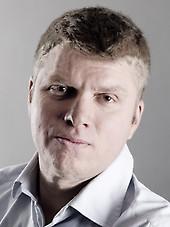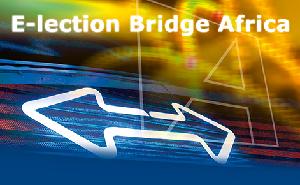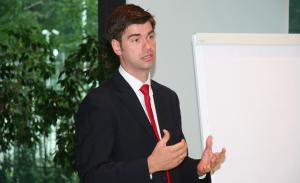Interview mit Ralf Güldenzopf - Media Programme Sub-Saharan Africa
Asset Publisher
"Data-mining is becoming increasingly more important"
KAS E-Lection Bridge Interview with Ralf Güldenzopf
Asset Publisher
Every four years political communicators look to America. In the land of almost unlimited financial and technological possibilities trends are set, especially in the field of political communication. Currently, tele-townhalls are a hot topic. Ralf Güldenzopf has not only dealt with this instrument theoretically, he also organized and conducted Germany’s first tele-townhall. Reason enough for the KAS E-lection Bridge Africa to invite him to an interview.
KAS MEDIA AFRICA: Welcome to the E-lection Bridge Africa, Mr. Güldenzopf. How high is your telephone bill?
RALF GÜLDENZOPF: (laughs) The private calls could be around 35 Euro, why?
KAS MEDIA AFRICA: We’ve heard you call over 6000 people simultaneously. That’s certainly more expensive than 35 Euro, isn’t it?
RALF GÜLDENZOPF: Yes and no. In November 2010, together with two CDU politicians, we conducted Germany’s first tele-townhall and actually called around 6,800 members of the public. But the bill was not as high as you probably think. Altogether it was about 4000 Euro. That is indeed a lot more than 35 Euro (laughs), but the results were priceless. We had almost 1600 people involved. Another 2000 received a message on their voice mail. Of course, not everyone remains from beginning to end, but in the course of 35 minutes there were always at least 300 people on the telephone. And on average the participants were on the line about ten minutes, a very good rate, I think.
Ralf Güldenzopf has been director of the Political Communication Department since March 1st, 2009. Previously, he was co-founder of “blueberry consulting” and worked as a consultant for political communication and campaigns. He studied political science, psychology and economics at the Friedrich Schiller University in Jena and the University of Virginia in Charlottsville (USA). Güldenzopf held various teaching appointments in Jena, in the field of empirical social research, for instance, as well as in campaigns and elections.
KAS MEDIA AFRICA: Can you explain the concept of a tele-townhall?
RALF GÜLDENZOPF: It is a relatively new instrument of political communication from the U.S.. Basically, it is a combination of a telephone conference and an interactive radio show. Politicians can use a tele-townhall to engage with their voters, supporters and the public. But the best part is they can strike up a dialogue with each other.
KAS MEDIA AFRICA: What do political parties require in order to conduct such conferences?
RALF GÜLDENZOPF: Essentially, the party only needs a databank where at least the telephone numbers of the participants are stored. Even better would be further information, such as the name and place of residence, to ease communication. Tele-townhalls are web-based, and take place on the internet. There are providers that supply the software.
KAS MEDIA AFRICA: How can we picture it in practice?
RALF GÜLDENZOPF: In practice, such a conference works as follows: The software program calls the selected telephone numbers virtually simultaneously – that could be more than 100,000 numbers. If participants are not available, they receive a message on their answering machine or voice mail. Meanwhile, the politician sits at his computer, greets the participants via his headset and begins the introduction. During the tele-townhall the guests are invited to ask questions. At the push of a button they end up at the ‘back office’, where supporters enter the questions into the system. The politician has the final word on his computer regarding which listeners will be spoken to live. Believe me; lots of interesting discussions are generated.
KAS MEDIA AFRICA: But political communicators also reach several thousand people at a normal campaign rally. What do tele-townhalls offer that other instruments don’t?
RALF GÜLDENZOPF: A sense of personal proximity is established through the telephone call. Plus, the interactivity plays a major role. Besides asking questions, the participants can answer prepared surveys, and political parties can collect important information about the interests and preferences of the public. The quality of the exchange is high.
Political communication is a major focus at the KAS. This important topic has been represented by its own department within political education for over a decade. Currently, Ralf Güldenzopf’s 5-person team presents workshops and trainings on the topics rhetoric, internet, press and publicity, and effective crisis management. These are aimed at local politicians and volunteers. Communication skills are a focal point of the department’s work in 2012.
KAS MEDIA AFRICA: Are there other advantages?
RALF GÜLDENZOPF: An additional advantage is the cost-benefit ratio. Compared to classic tools, such as a campaign rally, the conferences are very reasonable. Also, the spontaneity is a plus factor. A politician can start a tele-townhall at the airport, for instance, while waiting for his flight. He just needs a laptop and internet access and is therefore mobile.
KAS MEDIA AFRICA: In the U.S. tele-townhalls have already been tested in campaigns. They even play an important role in the current contest. What other trends can you identify in the current US campaign?
RALF GÜLDENZOPF: I see three interesting tendencies: First, there is the growing importance of TV debates. Candidates can shine with little financial support. For example, the verbal sparring in the Republican primaries in South Carolina was insane. Newt Gingrich fought brilliantly and won the election partly because of the TV debate. Secondly, data-mining is becoming increasingly more important. The point here is to discover new voting patterns from the data. And thirdly, the candidates continue to spend more money. By the way, the U.S. campaign is a topic in our weekly video blog, ‘Politsnack’. On our homepage (www.politsnack.de) we deal with current results and trends. In one episode we also closely examined tele-townhalls.
KAS MEDIA AFRICA: Thank you very much. But we still have one last question, which is the same in every KAS E-lection Bridge Africa interview: What is the next big thing?
RALF GÜLDENZOPF: The relevance of political communication instruments, such as tele-townhalls, cannot be underestimated. However, I’ll go out on a limb here and claim that content will become more important again.





